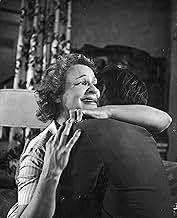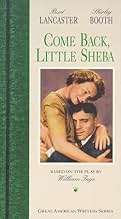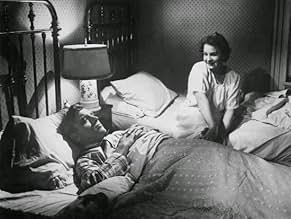CALIFICACIÓN DE IMDb
7.5/10
5.6 k
TU CALIFICACIÓN
Un alcohólico en recuperación emocionalmente remoto y su esposa desaliñada y poco ambiciosa se enfrentan a una crisis personal cuando acogen a una atractiva inquilina.Un alcohólico en recuperación emocionalmente remoto y su esposa desaliñada y poco ambiciosa se enfrentan a una crisis personal cuando acogen a una atractiva inquilina.Un alcohólico en recuperación emocionalmente remoto y su esposa desaliñada y poco ambiciosa se enfrentan a una crisis personal cuando acogen a una atractiva inquilina.
- Ganó 1 premio Óscar
- 7 premios ganados y 8 nominaciones en total
Robert Fuller
- Extra
- (sin créditos)
Ned Glass
- Man at AA Meeting
- (sin créditos)
William Haade
- Hospital Intern
- (sin créditos)
Virginia Hall
- Blonde in Diner
- (sin créditos)
Anthony Jochim
- Mr. Cruthers
- (sin créditos)
Peter Leeds
- Milkman
- (sin créditos)
Kitty McHugh
- Pearl Stinson - AA Member
- (sin créditos)
Paul McVey
- Postman
- (sin créditos)
Beverly Mook
- Judy Coffman
- (sin créditos)
Virginia Mullen
- Henrietta Colby - AA Member
- (sin créditos)
- Dirección
- Guionistas
- Todo el elenco y el equipo
- Producción, taquilla y más en IMDbPro
Opiniones destacadas
Shirley Booth was 54 when she won the Academy Award as Best Actress for her performance as Lola in the screen version of William Inge's "Come Back, Little Sheba". It was also her screen debut in a role that had previously won her a Tony on the stage and, quite frankly, she was magnificent. It launched her on a short-lived movie career and a slightly longer career on television. It's a fine film, well directed by Daniel Mann and adapted by Ketti Frings and it has three other good performances from Burt Lancaster as the alcoholic Doc, Terry Moore as the young lodger who, unwittingly, is the cause of Doc's hitting the bottle again and Richard Jaeckel as the athletic stud Moore is dallying with. Admittedly Lancaster, who at 39 was 15 years younger than Booth, isn't really right for his role, (he was too young for starters), but he handles it very effectively. Nevertheless, this is Booth's show. If she had never done anything else on screen she would still have earned her place in the pantheon of great performances.
Shirley Booth was a remarkably versatile actress - she did comedies, musicals, and dramas - and won the adoration of critics and audiences in all. But as with Agnes Moorehead and Eve Arden, her success in a TV comedy, "Hazel" tended to over-shadow her work on stage or film. A well-liked comedic actress on Broadway since the 1930s, she reinvented herself as a dramatic actress in 1949 with COME BACK, LITTLE SHEBA, winning every award in sight. Although the film version was offered to the likes of Bette Davis (who turned it down because she felt she couldn't bring to the role the "gorgeous vagueness" Booth had), Hal Wallis wisely went with Booth to recreate her stage role, casting Burt Lancaster for box-office appeal.
Booth's performance as Lola is astonishing, filled with nervous energy and anxiety, living on the edge - ask anyone who's ever lived with an alcoholic - every gesture, every emotion she plays, is honest and accurate. When I finally saw this film in the early 1990s, I was floored by Booth - where in heck had she done her research? Help for families of alcoholics (the Al-Anon Family Groups) was still several years off when the stage version was done - the resources available to Booth would have been "open" AA meetings and perhaps talking with family members. (Incidentally, the director, Daniel Mann, wasn't finished with AA - a more realistic AA meeting figured in his 1956 I'LL CRY TOMORROW, in which he directed Susan Hayward to an Oscar nomination - ironically, she lost out to Anna Magnani's Mann-directed performance in THE ROSE TATTOO!)
Booth was still alive at the time I first saw this film (around 1991-92), and I knew after watching that, unfortunately, her great success as TV's "Hazel" over-shadowed SHEBA, and that when she died, the obit's would begin, "Shirley Booth, TV's HAZEL, is Dead..." and I was right. Agnes Moorehead had a similar fate - the generation which grew up on "Bewitched" was clueless that Moorehead was one of the finest, most versatile and respected actresses around and, like Booth, every bit the equal of the other leading ladies (whom she'd usually supported). I remember attending a screening for the 50th anniversary of CITIZEN KANE and hearing gasps of astonishment as the cast's names appeared "That was AGNES MOOREHEAD!!!!"
Yes, indeed. And THAT was Shirley Booth, breaking our hearts in COME BACK, LITTLE SHEBA. Forget "Hazel," and bring tissues.
Booth's performance as Lola is astonishing, filled with nervous energy and anxiety, living on the edge - ask anyone who's ever lived with an alcoholic - every gesture, every emotion she plays, is honest and accurate. When I finally saw this film in the early 1990s, I was floored by Booth - where in heck had she done her research? Help for families of alcoholics (the Al-Anon Family Groups) was still several years off when the stage version was done - the resources available to Booth would have been "open" AA meetings and perhaps talking with family members. (Incidentally, the director, Daniel Mann, wasn't finished with AA - a more realistic AA meeting figured in his 1956 I'LL CRY TOMORROW, in which he directed Susan Hayward to an Oscar nomination - ironically, she lost out to Anna Magnani's Mann-directed performance in THE ROSE TATTOO!)
Booth was still alive at the time I first saw this film (around 1991-92), and I knew after watching that, unfortunately, her great success as TV's "Hazel" over-shadowed SHEBA, and that when she died, the obit's would begin, "Shirley Booth, TV's HAZEL, is Dead..." and I was right. Agnes Moorehead had a similar fate - the generation which grew up on "Bewitched" was clueless that Moorehead was one of the finest, most versatile and respected actresses around and, like Booth, every bit the equal of the other leading ladies (whom she'd usually supported). I remember attending a screening for the 50th anniversary of CITIZEN KANE and hearing gasps of astonishment as the cast's names appeared "That was AGNES MOOREHEAD!!!!"
Yes, indeed. And THAT was Shirley Booth, breaking our hearts in COME BACK, LITTLE SHEBA. Forget "Hazel," and bring tissues.
An acting triumph for both Shirley Booth and Burt Lancaster. This film will stay with you for a long time. Booth won a well deserved Oscar for this performance and it is well worth the time to view it. This is not a happy film obviously to look at but if you appreciate great acting as much as I do, you will really enjoy Come Back Little Sheba.
This film is as powerful as when I first saw it as a teenager. One would think that after 50 years, the material would seem dated. But in fact, a lot of what was said then, seems even more relevant today. Inge is unfortunately a very underrated writer. He seemed to respond to things on a much more emotional level than many of his contemporaries and this is why his material has not lost interest. His plays never seem to go to an intellectual level. He wrote about what he knew and didn't try to be something he wasn't. Are there really Blanche DuBois and Willie Lomans today? Just listening to those plays, as wonderful as they might be, is something we can no longer relate to. But there will always be Lola Delaneys. Everyone knows a few of them. The film was obviously made on a very tight budget and we are lucky for that. Imagine how it would have been had they cast Rosiland Russell and Jimmy Stewart. Though Burt Lancaster was miscast, the simple fact that he was a great actor, means his performance comes off amazingly well. And what more can be said about Booth, except the extreme regret we who never saw her in the play onstage must feel. The power of that performance is beyond description. Anyone who likes this movie should try to get hold of the new recording of the musical version. It was obviously written by people with tremendous love and respect for Inge's work.
Burt Lancaster, Shirley Booth, and Terry Moore shine in this very fine flick. In watching it, if you know anything at all about denial, projection, alcoholism, and Alcholics Anonymous, this is a wonderful telling of the psychological and spiritual truths behind the disease. Certain attitudes and comments, projected so well by both Booth and Lancaster, along with the innocent bystander Moore, are dead on. The activities of the men who come to deal with Lancaster while he is in his cups are straight out of the "Big Book". And the resultant coming to grips with the thing, a turn around in out look, are perfect examples of "progress, not perfection" and "having had a spiritual awakening". For the plot, the great acting ability, the talent both in front of and behind the camera, and, for me anyway, the psychology of the thing, it just doesn't get much better than this.
¿Sabías que…?
- TriviaShirley Booth's movie debut.
- ErroresWhen Doc takes the bottle from the kitchen cabinet, inexplicably there is no knob on the left hand door. When Lola opens the cabinet to check on the bottle, the knob is there and she uses it to open the same door.
- Citas
Doc Delaney: Alcoholics are mostly disappointed men.
Lola Delaney: Sure, I know.
[pause]
Lola Delaney: You was never disappointed, were you, Doc?
- ConexionesFeatured in Film Review: Burt Lancaster (1968)
Selecciones populares
Inicia sesión para calificar y agrega a la lista de videos para obtener recomendaciones personalizadas
- How long is Come Back, Little Sheba?Con tecnología de Alexa
Detalles
- Fecha de lanzamiento
- País de origen
- Idioma
- También se conoce como
- Come Back, Little Sheba
- Locaciones de filmación
- Productora
- Ver más créditos de la compañía en IMDbPro
- Tiempo de ejecución1 hora 39 minutos
- Color
- Relación de aspecto
- 1.37 : 1
Contribuir a esta página
Sugiere una edición o agrega el contenido que falta

Principales brechas de datos
What is the Hindi language plot outline for Sin rastro del pasado (1952)?
Responda



































